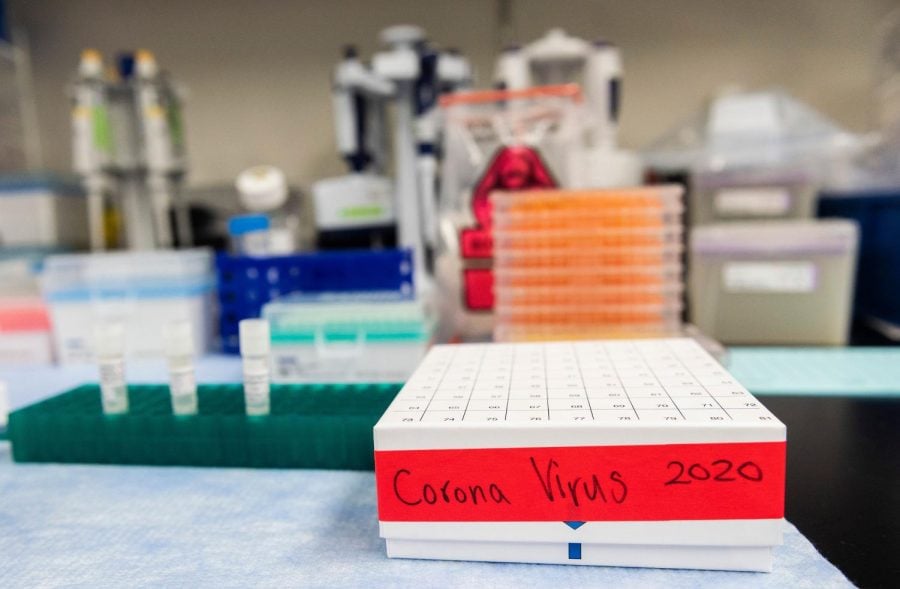Feinberg physicians and students get COVID-19 vaccine, stress continued vigilance
Andrew Caballero-Reynolds/AFP/Getty Images/TNS
Northwestern Medicine announced Pfizer COVID-19 vaccine registration Dec. 15. Feinberg physicians and students were among the first to receive it.
January 14, 2021
Northwestern Medicine has been distributing the Pfizer-BioNTech COVID-19 vaccine to affiliates since the U.S. Food and Drug Administration first issued its emergency use authorization on Dec. 11, 2020. Among the first to receive the vaccine are Feinberg physicians and students.
The Pfizer vaccine uses mRNA to create an immune response against the SARS-CoV-2 virus that causes COVID-19. The immune system generates “tools” to fight the virus, teaching the body to defend itself in case of another infection. To do so, the mRNA vaccine gives instructions that help the body produce the proteins ordinarily found on the virus causing COVID-19. While these proteins are harmless, they resemble the virus enough in order to trigger an immune response the body is able to remember and replicate. But to reach full effectiveness, one must receive a second dose three weeks later.
University vaccine distribution must comply with the Illinois Department of Public Health prioritization plan per Centers for Disease Control and Prevention protocol. The plan states in phase 1(a), healthcare workers and long-term care residents are prioritized. Individuals over the age of 64 and frontline essential workers are next in line in phase 1(b).
Feinberg physicians and students started registering and receiving their first dose of the Pfizer vaccine at one of many distribution sites in Chicago on Dec. 15.
According to a Northwestern Medicine email, as of Jan. 14 the hospital has administered 21,826 first-dose COVID-19 vaccines and 11,700 second-dose ones since then.
“I felt very privileged to be able to get the vaccine mixed with slight trepidation at being one of the early recipients of the vaccine itself,” Feinberg Prof. Mita Sanghavi Goel said. “The relatively low rate of serious side effects makes it a no brainer to get the vaccine. Yes, many people might feel (sick) for a day or two, but in comparison to the toll that COVID has reached on families and communities, this is a small side effect.”
When she went to receive her first dose, Goel said she felt only minor arm soreness. Twenty-seven hours after receiving her second dose, she developed chills, a fever and fatigue which lasted only 24 hours.
Feinberg Prof. Jennie Lin received her first dose three days after registration opened. She said she experienced arm soreness for 24-48 hours. She also reported experiencing a mild headache and fatigue the following day.
By the second dose, Lin said she still felt arm soreness at the injection site and mild flushing in the cheeks, as well as fatigue again on the second day.
“It’s not anything to be afraid of,” Lin said. “You may experience noticeable side effects such as arm soreness, fever, chills and muscle aches, but these side effects are not going to be as severe as having symptomatic COVID.”
Feinberg second-year Tricia Pendergrast also received the vaccine, but felt frustrated with the phases as outlined by the IDPH’s rollout plan. She said the phases are ambiguous with too much discrepancy across states — an outcome she said is the result of lacking federal leadership. The Illinois Medical Professionals Action Collaborative Team has called on higher authority for the signal to switch to phase 1(b) because the ability of healthcare institutions to make these decisions is restricted, she said.
While Pendergrast said she’s impressed with Feinberg’s response to the pandemic, she said she feels not all medical schools have been prioritizing their students’ health.
“It is inappropriate to expect students to go into a dangerous situation without being confident that (schools) can ensure their safety,” Pendergrast said. “We can be easily coerced into doing things that are not necessarily in our best interest safety-wise for the sake of (completing) our programs or grades.”
Despite receiving both doses of the vaccine, all three of the sources interviewed said they will continue practicing social distancing and wearing personal protective equipment.
Lin said her decision to continue taking these precautionary measures is less about protecting herself and more to prevent spreading the virus, in case it may be able to incubate and spread asymptomatically.
“I would recommend that everyone who receives the vaccine continues with caution and masking and social distancing in the same way they would have before getting the vaccine,” Goel said. “The data we have shows that you are less likely to get COVID if you’ve received the vaccine, but there is still the potential that you can spread COVID asymptomatically.”
Email: amittal@u.northwestern.edu
Twitter: @amittal27
Related Stories:
— NU professors discuss the possibility of mandating the COVID-19 vaccine
— Pritzker lowers Illinois Phase 1B vaccine eligibility age to 65, citing equity reasons
— Evanston, NU gear up for next phases of vaccine distribution



